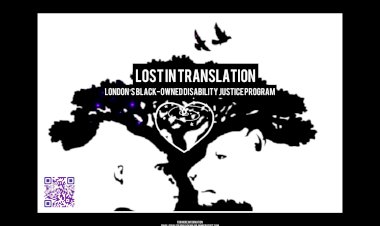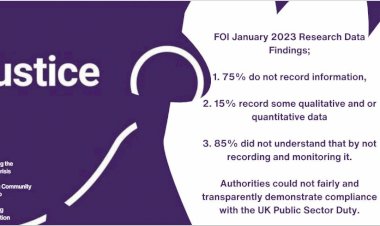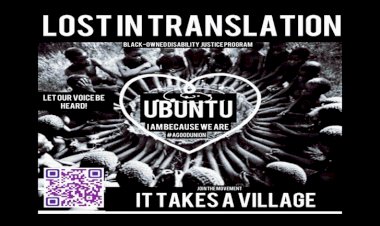Epistemological decolonization and Extractivism - What Does it mean to African and African Caribbean Neurodivergent and Disabled People's Communities
Since the colonial relationship affects both colonized and colonizers, understanding the possibilities of decolonization involve decolonizing both the colonizer’s knowledge and the knowledge of the colonized.


In January 2023, BME Volunteers CIC wrote to 430 UK Public Authorities. Our findings unveil
that there is a distinct lack of “by and for” (Black-Owned or Black–led) provisions for African
and African Caribbean People' compared to other ethnicities. As an ethnic group, we compare
unfairly with regard to equitable access to adequate and appropriate public services, social
spaces, and activities. Often, we are aggregated as Black or Brown to meet the equality act
public sector duty by decision-makers. This often leads to feelings of loneliness and depression,
which can have a significant impact on an individual's visible and invisible health.
Epistemological decolonisation - What does it mean to you?
Epistemological decolonisation is a process of challenging and dismantling the dominant
knowledge systems that have been imposed on colonised societies. It involves questioning the
ways in which knowledge is produced, who produces it, and for what purpose. Epistemological
decolonisation is a critical aspect of decolonisation, as it seeks to challenge the ways in which
colonialism has shaped our understanding of the world.
One of the key aspects of epistemological decolonisation is the recognition of the diversity of
knowledge systems that exist in the world. Colonialism imposed a Eurocentric view of
knowledge that prioritised Caucasian ways of knowing and marginalised African knowledge
systems.
Black Majority Ethnicity calls for an Epistemological Decolonisation Impact Analysis (EDIA)
intervention as part of public sector equality duty assessments seeking to challenge this by
recognising the value of different knowledge systems and the need to create space for them to
coexist.
Another aspect of epistemological decolonisation is the recognition of the role of power in the
production, neo-colonial systems, and dissemination of knowledge. As Colonialism created a
system in which knowledge was extracted and controlled by the colonisers, and this knowledge
was used to justify their domination over colonised societies.
Black Majority Ethnicity call for the co-development and co-production of a “by and for”
Epistemological Decolonisation Impact Analysis Tool that challenges this by recognising racial
and “intellectual” capitalism, the need for knowledge to be produced by and for the people who
are affected by it.
Our Epistemological decolonisation would also involve the recognition of the importance of
truth, justice, fairness and language in the production and dissemination of knowledge.
Colonialism imposed European languages, culture, and values on colonised societies, which
marginalised local belief systems, traditional practices, barter systems, justice systems,
languages, and knowledge systems.
We want to challenge this by recognising the importance of local culture and traditions before
colonisation, systems and languages and the need to create space for them to be used in the coproduction and co-dissemination of knowledge.
The impact of epistemological decolonisation can be seen in the growing recognition of the
value of indigenous knowledge systems and the need to create space for them to coexist with
Western knowledge systems. It may lead to a greater recognition of the role of power in the
production and dissemination of knowledge, and the need to create more equitable systems of
knowledge production and dissemination.
Epistemological decolonisation is an ongoing process, and it requires ongoing engagement and
dialogue to challenge and dismantle the dominant knowledge systems that have been imposed
on colonised societies.
Epistemological extrativism – What does it mean to you?
Epistemological extrativism is a concept that refers to the extraction of knowledge from
colonised societies without regard for the people and communities from which it is taken. It is a
form of knowledge extraction that is similar to resource extraction, in that it involves taking
something of value from a community without giving anything in return.
Epistemological extrativism is a product of colonialism, which created a system in which
knowledge was produced and controlled by the colonisers. This knowledge was often taken
from colonised societies without regard for the people and communities from which it was
taken. This process of knowledge extraction reinforced the power dynamics of colonialism, in
which colonisers were seen as superior to colonised peoples.
One of the key aspects of epistemological extrativism is the lack of recognition of the value of
local knowledge systems. Colonialism imposed a Eurocentric view of knowledge that
marginalised other knowledge systems. This led to the extraction of knowledge from colonised
societies without regard for the value of local knowledge systems.
Another aspect of epistemological extrativism is the lack of recognition of the role of power in
the production and dissemination of knowledge. Colonialism created a system in which
knowledge was produced and controlled by the colonisers, and this knowledge was used to
justify their domination over colonised societies. Epistemological extrativism perpetuates this
system by continuing to extract knowledge from colonised societies without regard for the
power dynamics involved.
The impact of epistemological extrativism can be seen in the continued marginalisation of local
knowledge systems and the perpetuation of power dynamics that were established during
colonialism. It has also led to a lack of recognition of the value of local knowledge systems and
the need to create space for them to coexist with Western knowledge systems.

To address epistemological extrativism, it is necessary to recognise the value of local
knowledge systems and the need to create space for them to coexist with Western knowledge
systems. This requires a recognition of the power dynamics involved in the production and
dissemination of knowledge, and a commitment to creating more equitable systems of
knowledge production and dissemination. It also requires a recognition of the need to give back
to the communities from which knowledge is taken, and to create systems of knowledge
production and dissemination that are based on mutual respect and collaboration.

It is essential that African and African Caribbean Equality and Justice Community come
together to work towards greater “by and for” diversity, inclusivity, and accessibility for all
families.
????????Looking after our physical, psychological, and physiological well-being is vital. Here are 7
areas where small changes may make a big difference:
???? Reframe unhelpful thoughts and be present
????????♂️ Exercise in water ???? or swim regularly
????????♀️Fast
???? Connect with others
???? Eat and Drink natural foods
???? Do something for others
???? Write a letter to future you
























